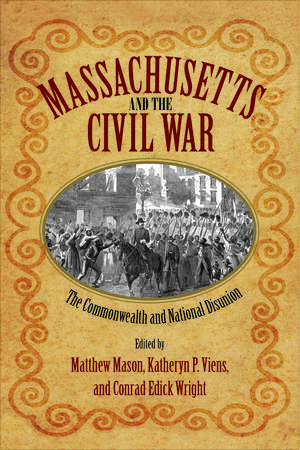Massachusetts and the Civil War: The Commonwealth and National Disunion
Editat de Matthew Mason, Katheryn P. Viens, Conrad Edick Wrighten Limba Engleză Paperback – 29 iun 2015
All states are not created equal, at least not when it comes to their influence on American history. That assumption underlies Massachusetts and the Civil War. The volume's ten essays coalesce around the national significance of Massachusetts through the Civil War era, the ways in which the commonwealth reflected and even modeled the Union's precarious but real wartime unification, and the Bay State's postwar return to the schisms that predated the war. Rather than attempting to summarize every aspect of the state's contribution to the wartime Union, the collection focuses on what was distinctive about its influence during the great crisis of national unity.
In the first section, "The Opposition to Slavery," essays by John Stauffer, Dean Grodzins, Peter Wirzbicki, and Richard S. Newman demonstrate the central role Massachusetts played in the rise of both the antislavery movement and abolitionism. They show how slavery's foes united, planned, and understood their cause, and how they envisioned a postwar nation free of servitude. In the second section, "The War Years," Matthew Mason, Carol Bundy, and Ronald J. Zboray and Mary Saracino Zboray investigate how the exigencies of war unified the commonwealth across party lines and over the distance between home and the front. In the final section, "Reconciliation," Sarah J. Purcell, Amy Morsman, and Kanisorn Wongsrichanalai probe postwar efforts to recover from the war's profound disruptions.
In the first section, "The Opposition to Slavery," essays by John Stauffer, Dean Grodzins, Peter Wirzbicki, and Richard S. Newman demonstrate the central role Massachusetts played in the rise of both the antislavery movement and abolitionism. They show how slavery's foes united, planned, and understood their cause, and how they envisioned a postwar nation free of servitude. In the second section, "The War Years," Matthew Mason, Carol Bundy, and Ronald J. Zboray and Mary Saracino Zboray investigate how the exigencies of war unified the commonwealth across party lines and over the distance between home and the front. In the final section, "Reconciliation," Sarah J. Purcell, Amy Morsman, and Kanisorn Wongsrichanalai probe postwar efforts to recover from the war's profound disruptions.
Preț: 223.66 lei
Nou
Puncte Express: 335
Preț estimativ în valută:
42.81€ • 46.52$ • 35.98£
42.81€ • 46.52$ • 35.98£
Carte indisponibilă temporar
Doresc să fiu notificat când acest titlu va fi disponibil:
Se trimite...
Preluare comenzi: 021 569.72.76
Specificații
ISBN-13: 9781625341501
ISBN-10: 1625341504
Pagini: 320
Ilustrații: 10 b&w illus.
Dimensiuni: 152 x 229 x 20 mm
Greutate: 0.41 kg
Ediția:First Edition
Editura: University of Massachusetts Press
Colecția University of Massachusetts Press
ISBN-10: 1625341504
Pagini: 320
Ilustrații: 10 b&w illus.
Dimensiuni: 152 x 229 x 20 mm
Greutate: 0.41 kg
Ediția:First Edition
Editura: University of Massachusetts Press
Colecția University of Massachusetts Press
Notă biografică
Matthew Mason is associate professor of history at Brigham Young University. Kathryn P. Viens is research coordinator at the Massachusetts Historical Society. Conrad Edick Wright is Worthington C. Ford Editor and director of research at the Massachusetts Historical Society and author of Revolutionary Generation: Harvard Men and the Consequences of Independence (University of Massachusetts Press, 2005).
Recenzii
"I commend the individual authors for underscoring diversity, not uniformity, in the Massachusetts experience and also for weaving a broad range of historical actors, African Americans and women, black and white, into their work."—John David Smith, author of We Ask Only for Even-Handed Justice: Black Voices from Reconstruction, 1865–1877 (University of Massachusetts Press, 2014)
"Matthew Mason and his co-editors avoid the traps awaiting collections of this nature, which include exaggerating the Commonwealth's significance and trying to cover an unruly variety of themes. Instead they address three sets of topics that provide some unusual insights into the Commonwealth's encounter with war, disunion, and emancipation. In the process they help put Massachusetts abolitionism into a wider perspective."—Civil War Review
"One important theme throughout the essays is an exploration of how and why those seeking to end slavery joined forces with those who sought the more robust reform platform of black citizenship and black American equality. The authors pint to the securitization of the federal state, violence embedded in the political process, racial prejudice, the flow of information in an age of letter writing, and much more. This rich collection speaks not only to those focused on Massachusetts but also to New England and the nation. Highly recommended."—Choice
"Matthew Mason and his co-editors avoid the traps awaiting collections of this nature, which include exaggerating the Commonwealth's significance and trying to cover an unruly variety of themes. Instead they address three sets of topics that provide some unusual insights into the Commonwealth's encounter with war, disunion, and emancipation. In the process they help put Massachusetts abolitionism into a wider perspective."—Civil War Review
"One important theme throughout the essays is an exploration of how and why those seeking to end slavery joined forces with those who sought the more robust reform platform of black citizenship and black American equality. The authors pint to the securitization of the federal state, violence embedded in the political process, racial prejudice, the flow of information in an age of letter writing, and much more. This rich collection speaks not only to those focused on Massachusetts but also to New England and the nation. Highly recommended."—Choice
